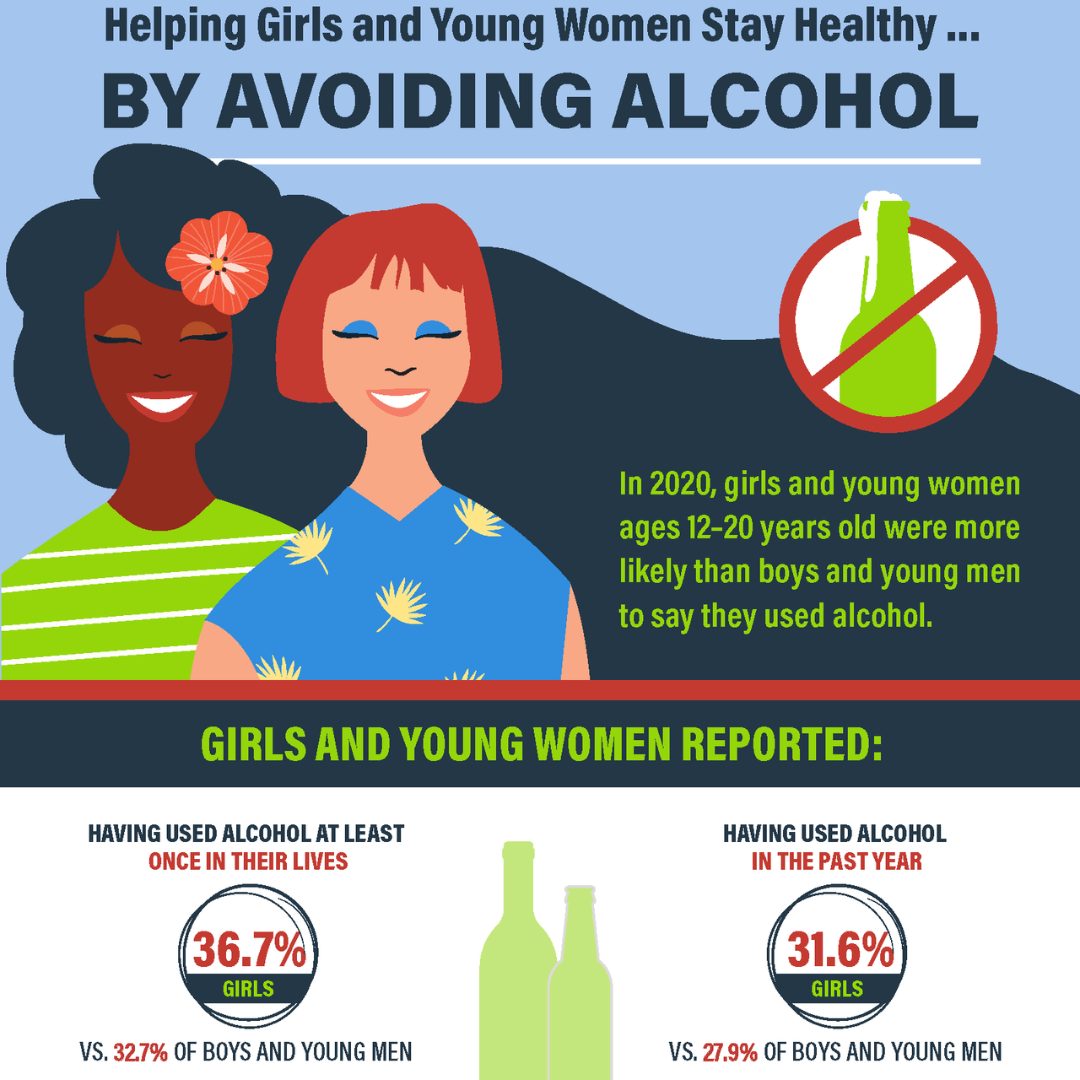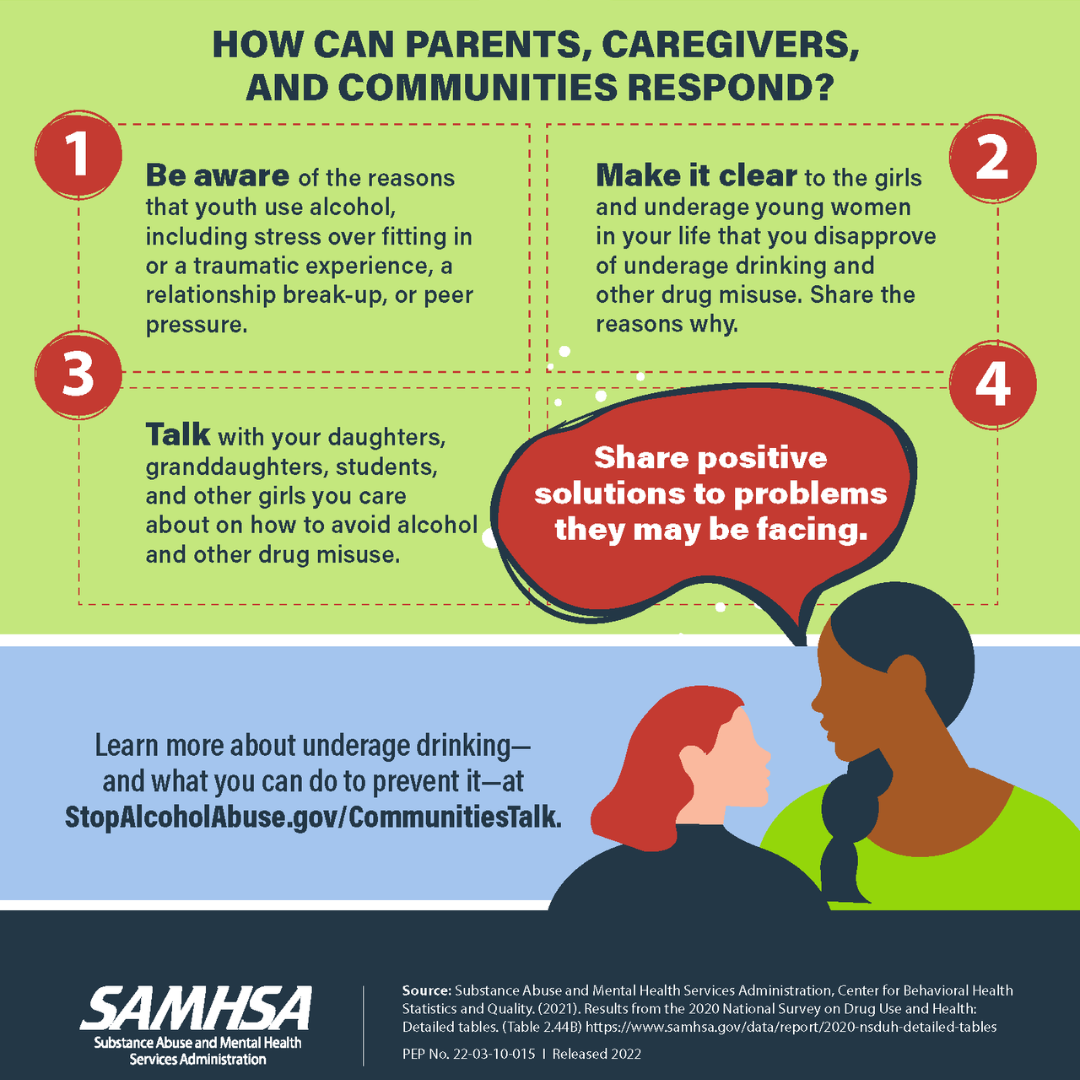|
For at least the past two decades, data showed that boys and young men were more likely to drink than girls and young women. However, an unsettling trend has taken hold: Data now show that girls and young women, ages 12 to 20, are drinking more alcohol than their male counterparts. Alcohol use by people under the legal drinking age of 21 has decreased over the past few decades, but the decreases were more pronounced for males than for females. In 2020, more girls and young women reported past-month alcohol use than boys and young men. 1 What is behind this trend? Here are some facts that organizations and those working in prevention should know as they design strategies to curb harmful drinking behaviors among girls and young women.
Mental Health Affects Underage Drinking Evidence suggests that problems with anxiety and depression are increasing among adolescents, particularly young women. Girls and young women can be more susceptible to internalizing stress, anxiety, depression, and other mental health issues. This, in turn, may make them more likely to drink as a way to cope.2 In fact, when girls have high levels of anxiety, they are more likely than boys to use alcohol, and to do so at earlier ages. Helping girls and young women handle difficult emotions in healthy ways may help them reduce their consumption of alcohol or avoid it altogether.3,4 Because of the association between underage drinking and mental health conditions such as depression and anxiety, girls and young women who have these challenges need strong underage drinking prevention support coupled with general mental health support. Alcohol Increases the Risk of Certain Health Problems Girls and young women differ biologically from boys and young men. Females tend to have less water in their bodies than males of the same weight, so the alcohol they drink becomes more concentrated in their blood, where it then travels to the brain.5 Other gender-specific physical risks faced by girls and young women who use alcohol include: -Increased risk of memory problems. Compared with boys, girls’ memories are more likely to be affected negatively by drinking. Girls and young women are more likely to experience memory impairments from alcohol, such as alcohol-induced blackouts.6 Furthermore, girls and young women who report binge drinking show less brain activity and worse performance on memory tests than peers who either drink a little or abstain. Boys and young men do not show the same outcomes.7 -A greater risk for long-term health consequences. Females are more susceptible than males to experiencing long-term health consequences like alcohol-induced liver inflammation and liver cancer, as well as cardiovascular disease. Drinking alcohol, even in girls and young women, contributes to future breast cancer.8 Among adult women, even one drink per day has been linked to a 5 to 9 percent higher chance of developing breast cancer compared to those who abstain from using alcohol. By educating young people and adults about the risks and consequences of alcohol use, we can work to continue the downward trend and address gender patterns of underage drinking and risky alcohol use. Parents and other caring adults play an important role in young people’s decisions to consume alcohol, so it is imperative that adults support girls and young women as they work to protect their mental and physical health. SAMHSA’s Prevention and Treatment of Anxiety, Depression, and Suicidal Thoughts and Behaviors Among College Students, and the HHS Office on Women’s Health and Girls Health websites have information to help caring adults navigate the mental health challenges girls and young women face as they transition to adulthood. Likewise, SAMHSA’s “Talk. They Hear You.” substance use prevention campaign and the Drug Enforcement Administration’s publication “Growing Up Drug Free” have resources to help adults start and continue conversations about alcohol use with children, teens, and young adults.
0 Comments
|
Archives
February 2024
|



 RSS Feed
RSS Feed

